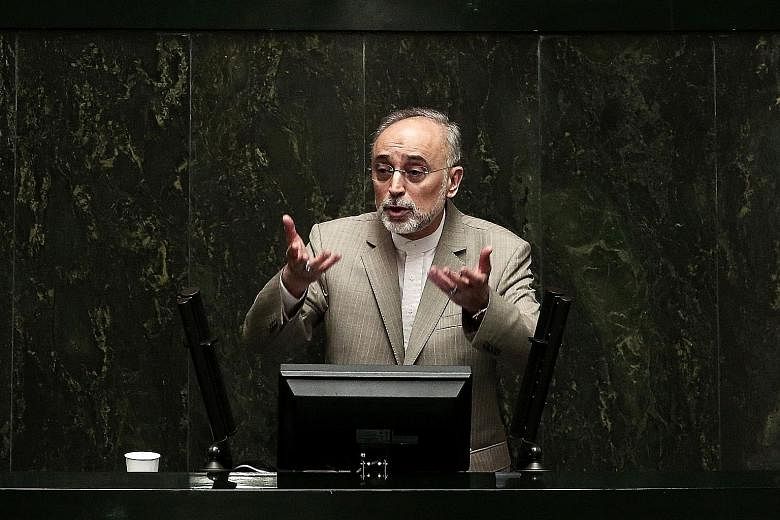TEHERAN • The Iranian Parliament will wait at least 80 days before voting on the nuclear agreement that the country reached last week with world powers.
The lawmakers have effectively opted to withhold their judgment, by forming a committee to study the accord, until they know whether the US Congress approves of the deal, analysts said.
That way they would avoid losing face by appearing to look weak if the agreement is rejected by their counterparts in the United States.
A telling indication of the Iranian's intent came on Tuesday when Foreign Minister Mohammad Javad Zarif and the head of the Atomic Energy Organisation of Iran, Mr Ali Akbar Salehi, defended the deal in Parliament.
Mr Salehi, a former foreign minister, took the extraordinary step of admitting that Iran's nuclear ambitions have been an expensive drag on Teheran's finances, already constrained by economic sanctions.
But the parliamentary delay in voting is seen as a way to shift the the blame to the Americans if Congress repudiates the agreement, which Iran and six big powers including the US completed in Vienna on July 14 after tough negotiations.
The United Nations Security Council unanimously approved a resolution on Monday that creates the basis for its sanctions against Iran to be lifted.
US Congress, where suspicion towards Iran remains deep-seated, has 60 days to review the nuclear agreement, and it will be at least 90 days before the UN resolution officially takes effect.
The agreement will end punitive sanctions imposed on Iran by the United Nations, the United States and the European Union in exchange for verifiable guarantees that the Iranian nuclear programme remains peaceful.
Iran, which has asserted repeatedly that it does not want nuclear weapons, agreed to severe limits on its atomic fuel and other restrictive steps, including increased surveillance by international inspectors, but retained much of the underlying infrastructure of its nuclear activities.
The Iranian Constitution gives Parliament the right to cancel the deal.
That outcome seems unlikely, however, given all the signs that Iran's top leaders, including Ayatollah Ali Khamenei, who has the last word, want it to succeed despite the antipathy he has expressed towards the US.
However, Iran will not accept any attempt to extend sanctions relating to its nuclear programme beyond 10 years, the Islamic Republic's senior nuclear negotiator Abbas Araqchi said yesterday.
He told a news conference that any attempt to reimpose sanctions after they expire in 10 years' time would be a breach of the agreement and would have "no credibility".
NEW YORK TIMES, REUTERS

